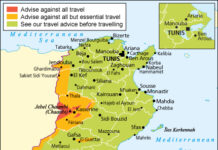 Will Larkins – Photo via Instagram.
Will Larkins – Photo via Instagram.A second federal lawsuit has been filed against four Florida school boards challenging the constitutionality of the state’s “Don’t Say Gay” law and districts’ attempts to conform with the law.
The Southern Poverty Law Center, Southern Legal Counsel and Lambda Legal filed the lawsuit in U.S. District Court for the Middle District of Florida on behalf of a group of plaintiffs, including a same-sex couple and their two children; an opposite-sex couple and their four children, one of whom is nonbinary; Will Larkins, an gay and nonbinary rising senior at Winter Park High School in Orange County, Florida; and Centerlink, Inc., an organization that supports local LGBTQ groups and community centers.
The school boards named in the lawsuit include Orange County Public Schools, the Indian River County School District, Duval County Public Schools, and the Palm Beach County School District.
In the lawsuit, the plaintiffs argue that the “Parental Rights in Education” law, dubbed the “Don’t Say Gay” law by critics, infringes on the plaintiffs’ right to free speech and expression under the First Amendment to the U.S. Constitution, and deprives them of their rights to due process and equal protection under the Fourteenth Amendment.
Under the law, discussion of sexual orientation or gender identity is banned in grades K-3 and restricted in students at the middle and high school level based on whether such content is “age-appropriate or developmentally appropriate” — terms that have not yet been defined by state education authorities. The law requires individual school districts to conform to its provisions, and allows parents to sue a district if they’re unhappy with the implementation of the law.
Each of the plaintiffs claims the law has affected them in some way, whether it’s by making a same-sex couple closet themselves in order to protect their children, lest some overly litigious parent use the acknowledgment of their family as justification for suing the school or trying to get teachers fired; by condoning bullying of LGBTQ youth by making teachers and staff afraid to intervene, lest they be accused of “grooming” or “indoctrinating” children; preventing children from acknowledging LGBTQ siblings as part of their family; or by punishing LGBTQ students like Larkins, who was investigated and forcibly transferred from one class after giving a historical presentation about the Stonewall Uprising.
“The purpose and effect of this breathtakingly broad law is to silence LGBTQ+ students and families, and the law’s imprecision intensifies its chilling effect. Because the law invites any parent dissatisfied with a school’s censorship of LGBTQ-related speech to sue the school district and collect attorney fees, it causes schools to aggressively control discussions that might trigger the type of moral objection that gave rise to this law,” Kell Olson, a staff attorney with Lambda Legal, said in a statement.
“Already, schools have cut anti-bullying guidance for K-12 teachers and pulled books from shelves,” Olson added. “LBGTQ+ parents are struggling to find gentle ways to explain to their children why they won’t be able to talk openly about their families when they go back to the classroom in a few weeks. This discriminatory law puts students at risk and sends a message of shame and stigma that has no place in schools.”
“We are deeply concerned about the negative effect that HB 1557 has upon our family,” plaintiffs David Dinan and Vikranth Gongidi, a same-sex couple raising two children, said in a statement. “The law limits our speech and our expression. The law forces us to self-censor for fear of prompting responses from our children’s teachers and classmates that would isolate our children and make them feel ashamed of their own family. It also causes irreparable harm to our children and to their development.”
“I am concerned that this law will eviscerate any hope of healthy and important discussions about LGBTQ+ issues or historical events, which are already lacking in our schools,” added Larkins. “Because of the vague language of the law, closed-minded parents are emboldened to become vigilantes to force their beliefs upon other people’s children by suing the school district over anything they disagree with.”
In response to requests for comment on the lawsuit, all four school districts being sued declined to discuss pending litigation, although Indian River County Schools added: “Our school district will continue to provide the support needed to students and staff members to ensure that no child is discriminated against and that ALL students are provided an equal opportunity to a high-quality education.”
The lawsuit is the second such one to be filed challenging the Florida law. In March, a group of parents, LGBTQ advocates, and LGBTQ youth — some of whom were targeted by administrators for discipline or censored preemptively after the bill was approved by the state legislature but before it went into effect — sued Gov. Ron DeSantis and state officials in U.S. District Court for the Northern District of Florida, claiming the law is vague, discriminatory and unconstitutional.
Lawyers for the plaintiffs in Central Florida maintain that the “Don’t Say Gay” law is discriminatory, and that it exacerbates what was already a hostile environment for LGBTQ youth in many schools across the state.
“Through our work with LGBTQ+ students across the state of Florida, we are profoundly aware of the ways in which many school districts were already failing to provide a safe and affirming learning environment for LGBTQ+ students even before this new assault on their rights,” Simone Chriss, director of the Transgender Rights Initiative at Southern Legal Counsel, said in a statement.
“As a result of [the ‘Don’t Say Gay’ law], the hard-won protections we’ve fought to put in place in Florida school districts to keep LGBTQ+ students safe, such as LGBTQ+ Critical Support Guides, anti-bullying policies, and inclusive materials, are being stripped away as schools move toward censorship to avoid expensive legal challenges by anti-LGBTQ+ parents,” added Chriss. “We will fight to right this wrong, to correct this injustice, and to ensure all students have access to a safe and affirming school environment.”










